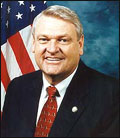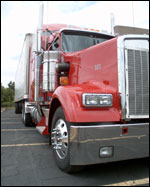When the Bush administration wants to gin up some environmental cred, it cites efforts underway to slash diesel emissions by requiring trucking companies to switch to cleaner engines. But the untold story is that it may be the taxpayers — not the polluters — who end up footing much of the bill.

Big Mac attack.
Photo: U.S. House.
The trucking industry has long been a leading opponent of federal clean-air regulations, and since 1993 it has had a relentless advocate in Rep. Mac Collins (R-Ga.), former owner of Collins Trucking Co. — a business that is now run by the representative’s family and that continues to pay him $21,600 a year as an adviser. U.S. EPA regulations will require truck fleets to switch to cleaner-burning diesel engines by 2007, and Collins, who’s running for the Senate this year, wants tax breaks to help companies like his defray the cost.
Claiming that the diesel regulations would financially hamstring the industry, 19 GOP members of the House, including Collins, recently asked the General Accounting Office — the watchdog arm of Congress responsible for scrutinizing the activities of federal agencies — to examine the diesel regulations.
The regs were proposed by the EPA in 2000 and put in place by the Clinton administration just before it left office in 2001. Just days later, the new Bush administration froze the regulations to give it time to determine whether their health benefits justified their costs to the American economy.
Satisfied that they did — with overwhelming scientific data to prove it — the Bush EPA then reinstated the Clinton rules with much tough-guy fanfare.
It’s hard to argue with the numbers: Cleaner diesel engines will prevent an estimated 8,300 deaths from respiratory disease per year, according to EPA research, and result in 17,600 fewer cases of acute bronchitis and 360,000 fewer asthma attacks in kids.
Today, the administration’s move to “aggressively tackle” diesel emissions is advertised as one of President Bush‘s top environmental accomplishments on his 2004 campaign website.
The trucking industry didn’t take well to the news that the diesel regs were going forward, but it may still get off the hook. Officials in the Bush EPA and in the GAO seem inclined to help the industry keep on truckin’ happily along — free of financial responsibility for the deadly pollution it creates.

Truck everlasting?
The GAO report [PDF] on the diesel regulations, released on March 11, “openly endorses recommendations truckers have been making for years and explicitly parrots the industry’s arguments behind these recommendations,” said Frank O’Donnell, executive director of Clean Air Trust. The report not only recommends that the agency consider “economic incentives” to help industry comply, but suggests that the EPA failed to give due consideration to industry concerns in drafting the regulations.
Even the Bush administration found this allegation absurd. Assistant EPA administrator for air and radiation, Jeffrey Holmstead, wrote an indignant letter to the GAO that challenged the report’s integrity and accuracy and implied that it was biased in favor of the trucking industry: “[T]he report simply appears to accept the views of one set of stakeholders … it leaves the reader with the impression that challenges are overly daunting and that industry is unable to address them. This is simply wrong,” he wrote.
Holmstead took particular umbrage at the report’s implication that the EPA did not adequately consider industry concerns: “Especially troubling are the suggestions in the report that the agency failed to engage the trucking industry in the 2007 rulemaking process. … I personally take the agency’s responsibility to engage stakeholders very seriously.”
The lead author of the GAO report, John Stephenson, was not available for comment.
Soon after the report was released, Holmstead accompanied EPA Administrator Mike Leavitt to a trucking industry meeting titled “Diesel Engine Emissions Summit II” in Fort Lauderdale, Fla., to address the report’s findings and assure the industry that the EPA is on its team.
“I am prepared to say, ‘Let’s work together,'” Leavitt announced to a round of applause from the audience of more than 900 industry representatives. He stressed that he is amenable to the idea of tax breaks to help trucking companies comply with the rules, saying it’s the government’s job to incentivize businesses “to do the right thing,” and that the EPA is “dependent on all of you to figure out how to do that.”
The EPA, though, does not typically ask taxpayers to shoulder the costs industry incurs when meeting new pollution standards. The health benefits of the diesel regs are supposed to justify their costs, and if the financial burden is heavy for industry, the costs get passed along to consumers anyway.
According to John Millett, an EPA spokesperson, the diesel emissions-reduction technology that will be required on new trucks by 2007 is expected to raise the cost of a truck by $1,200 to $1,900 — an increase of less than 1 percent on the truck’s total cost of between $150,000 to $200,000.
But the American Trucking Associations claims the costs will be markedly higher — between $5,000 and $10,000 per truck, according to the organization’s environmental counsel, Glen Kedzie. “Already the trucking industry has taken to buying up trucks in the pre-2007 fleet so they don’t have to face the additional costs that they expect will be posed by the post-2007 fleet,” he said.
Environmentalists say the trucking industry’s fears are grossly exaggerated. But the larger point, they say, is that taxpayers shouldn’t be forced to underwrite the costs, no matter what they are. A precedent like that would spark similar demands from every other regulated industry, eventually rendering pollution controls impracticable.
Still, Leavitt and Holmstead seem to see merit in abandoning the “polluter pays” principle. So concerned are they with the trucking industry’s financial health that they’ve invited Collins to help write legislation that will line his own pockets: At the industry meeting last month, Holmstead vowed to work with the Georgia representative to develop financial incentives to soften any blow to the trucking industry from the diesel regulations.

